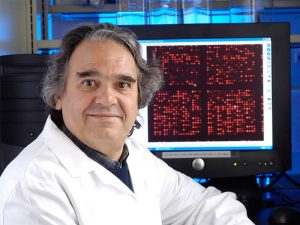A Springer Nature journal has issued an expression of concern for a 16-year-old paper by Carlo Croce, the cancer researcher – and noted art collector – at The Ohio State University three years after the publication had received a correction for problematic images and roughly 20 months after the news division at Nature reported on a pair of institutional investigations into problems with Croce’s work.
As we and others have reported, those investigations concluded Croce had not committed misconduct but had overlooked the misdeeds of others in his lab.
Here’s the notice for the paper, “MicroRNA signatures of TRAIL resistance in human non-small cell lung cancer,” which Oncogene published in 2008:
The Editors-in-Chief would like to alert the readers that following the Correction [1] of this article [2] to address the concerns raised regarding the western blot loading controls presented in Figs. 4c and 7a, further issues have been noted:
The western blot loading controls presented in Figs. 4d and 7c appear highly similar.
The U6 panel of Fig. 3b appears highly similar to the U6 panel of Fig. 4c of another article from the same author group that was submitted and published within a similar time frame [3].
The western blot loading controls presented in Fig. 5b and the originally published version of Fig. 7a appear highly similar to the control lanes 1 and 2 (flipped horizontally) of Fig. 3a of [4], which as also submitted and published within a similar time frame.
The authors have stated that the images used in the other articles [3, 4] are incorrect, and are issuing Corrections to replace them with the appropriate data. However, due to the number of concerns raised, readers are advised to interpret the presented data with caution.
M. Garofalo has stated on behalf of all authors that they do not agree to this editorial expression of concern.
The article has been cited 229 times, according to Clarivate’s Web of Science, of which 20 have come since the correction (which itself has received two citations).
David Sanders, a data sleuth and biologist at Purdue University who raised issues about the papers – and who successfully defended himself in a defamation suit Croce launched against him – told us last week he first notified Oncogene about the problematic articles in 2016.
When the correction appeared in January 2021, Sanders contacted the journal again with concerns about the statement, including:
Why is there no indication that there had been image duplication in the correction? How do you know that Figures 5b and 6a are correct?
Five months later, he raised still more questions about the article – but never heard back:
In violation of COPE rules, they have never contacted me about the resolution of this issue.
Sanders also pointed to evidence of plagiarism in the article, which OSU documents in one of its reports.
We asked Springer Nature to explain the lag – and why the journal felt an expression of concern was more appropriate than retraction in this case. The response from a spokesperson:
After a careful and thorough investigation, the Editors concluded that publishing an Editorial Expression of Concern was the most appropriate editorial action to take.
Oncogene has issued a double correction for another of Croce’s papers, “Fhit modulation of the Akt-survivin pathway in lung cancer cells: Fhit-tyrosine 114 (Y114) is essential,” originally published in 2006.
Like Retraction Watch? You can make a tax-deductible contribution to support our work, subscribe to our free daily digest or paid weekly update, follow us on Twitter, like us on Facebook, or add us to your RSS reader. If you find a retraction that’s not in The Retraction Watch Database, you can let us know here. For comments or feedback, email us at [email protected].

What is the total number of retracted papers from the very beginning of research to now?